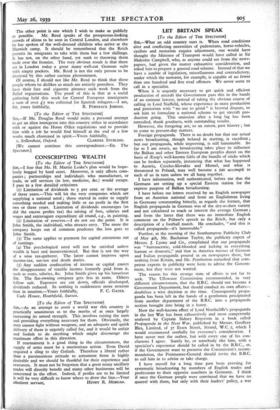CONSCRIPTING WEALTH
[To the Editor of THE SPECTATOR] SIR,—I fear that Mr. H. Martin Leake's plan would be hope- lessly bogged by hard cases. Moreover, it only affects corn- panics; partnerships and individuals who manufacture, or trade, or sell services (in law, medicine, &c.) would escape. I pass to a few detailed criticisms.
(1) Limitation of dividends to 5 per cent. or the average of three years.—This will hit the very companies which are supplying a national need ; those started in order to supply something needed and making little or no profit in the first two or three years. Limitation of dividends encourages (as did the excess profits tax) the raising of fees, salaries and wages and extravagant expenditure all round, e.g., in painting.
(2) Limitation of reserves.—I do not see the point. It is John Smith, the individual, who attracts envy. The more the company keeps out of common prudence the less goes to John Smith.
(3) The same applies to payment for capital extensions out of earnings.
(4) The psychological need will not be satisfied unless wealth is hurt and inconvenienced. But that is not the way of a wise tax-gatherer. The latter cannot improve upon income-tax, sur-tax and death duties.
(5) Any sudden confiscation of income or capital causes the disappearance of taxable income formerly paid from it, such as rents, salaries, &e. John Smith gives up his luxurious flat. The flat-owning company gets less in rents. Others follow suit. Expenses are cut down, officials discharged, dividends reduced. In nothing is suddenness more noxious


























































 Previous page
Previous page